By Peter Rüegg | ETH Zurich
Sleep problems have become a widespread issue. In a new popular science book and in an interview with ETH News, ETH sleep researcher Caroline Lustenberger describes the do’s (and don’ts) for when you can’t get to sleep.
In brief
- One third of people in Switzerland report experiencing moderate to severe problems with sleep. The number of people affected has been on the rise since 2012.
- Sleep researchers Caroline Lustenberger and Salome Kurth have written an accessible guide that clears up misconceptions and includes new scientific findings.
- The book aims to reduce the pressure many feel to achieve “perfect” sleep every night. It shows that sleep varies greatly from one person to the next.
ETH News: Ask around and you’ll find that almost everyone has trouble sleeping. Is it really such a big issue, or do we simply enjoy complaining?
Caroline Lustenberger: If I dismissed sleep problems as mere complaining, we wouldn’t be having this interview (laughs). For me, it’s a problem because sleep disorders are associated with a high level of suffering. Sleep is essential for human beings and yet more than a third of people in Switzerland report experiencing moderate to severe problems with their sleep.
Have these problems become more common?
Self-reported sleep problems have increased sharply since 2012. The Swiss government collects data every five years with surveys. The latest figures are the highest they’ve been since the survey was first conducted in 1997. Since the last survey in 2017, percentages have risen further, particularly among young people and women.
What kinds of sleep disorders are we talking about?
The most common sleep disorders in Switzerland are insomnia, sleep apnoea and restless legs syndrome. Insomnia is characterised by problems falling or staying asleep and is often caused by stress in our daily lives. Sleep apnoea, which is characterised by breathing being regularly interrupted during sleep, is often linked to lifestyle and is exacerbated by factors such as obesity. Some people also have restless legs syndrome which causes them to feel an unpleasant urge to move their legs and therefore cannot find rest. Each of these issues requires a different approach or therapy. These disorders require different approaches or therapies. For sleep apnoea, special breathing machines are commonly used, and lifestyle adjustments, such as weight loss, can be very effective. Cognitive behavioural therapy is often the first choice of treatment for insomnia. Most people who seek help and find a solution significantly improve their quality of life.
How do you explain the increase in cases?
Sleep problems and disorders have many causes. Key factors that have become increasingly apparent in recent decades are the constant pressure to perform, a lack of boundaries and the effects of digitisation. As a result, many people’s working days intertwine with their private lives and they lose that clear separation that comes from properly “finishing work for the day”. Stress and pressure are considered the greatest obstacles to a good night’s sleep. Stressful events such as wars, the coronavirus pandemic or uncertainties about the future intensify this state. For many of us, our thoughts start racing as soon as we get into bed. That makes it difficult to let go. People remain in a state of hyperarousal, inner tension and constant stress. Obesity and an increasingly sedentary lifestyle are also becoming more prevalent and are contributing to the increase in sleep disorders.
You’ve just written a popular guide to sleep with your colleague Salome Kurth at the University of Freiburg. What motivated you to do this?
On the one hand, we wanted to clear up misconceptions about the topic of sleep, and on the other hand, summarise new scientific findings. Through this clarification of the state of knowledge, we also wanted to relieve people of the pressure to sleep perfectly in order to avoid becoming ill. In researching for the book, we repeatedly saw how much of the information out there emphasises how important sleep is and that a person will get ill if they don’t get enough of it. While that’s certainly true in the long run, I also think it creates a lot of pressure: people are afraid of sleeping poorly or not “perfectly”, which, paradoxically, can actually cause problems with sleep.
And your book offers a counterbalance.
Exactly. In our book, we show how individual sleep is. Even aging changes sleep: the older you get, the less deep your sleep becomes and the more often you wake up at night. Some of these factors are beyond our control. They are part of our biology. What is important here is to cultivate a sense of calmness. Short-term sleep problems are common and relatively unproblematic. Our body has a remarkable ability to regulate itself to a certain extent. We want readers to accept this and, in doing so, feel permitted to relax more. However, we also emphasise that there are factors you can influence to improve your sleep, and the book helps readers understand which factors these are and how we can take control over them.
Continue to read the original article at ETH Zurich.
***
PD Dr. Caroline Lustenberger is a neuroscientist and lecturer at ETH Zurich. She has many years of experience in sleep research and is exploring how brain activity during sleep influences health.
Reference:
Salome Kurth und Caroline Lustenberger: ‘Dieses Buch ist zum Einschlafen – Individuelle Tipps für besseren Schlaf‘, Beobachter Edition (2024). ISBN 978-3-03875-573-9. (only in German)
Article Source:
Press Release/Material by ETH Zurich
Featured image credit: Freepik




